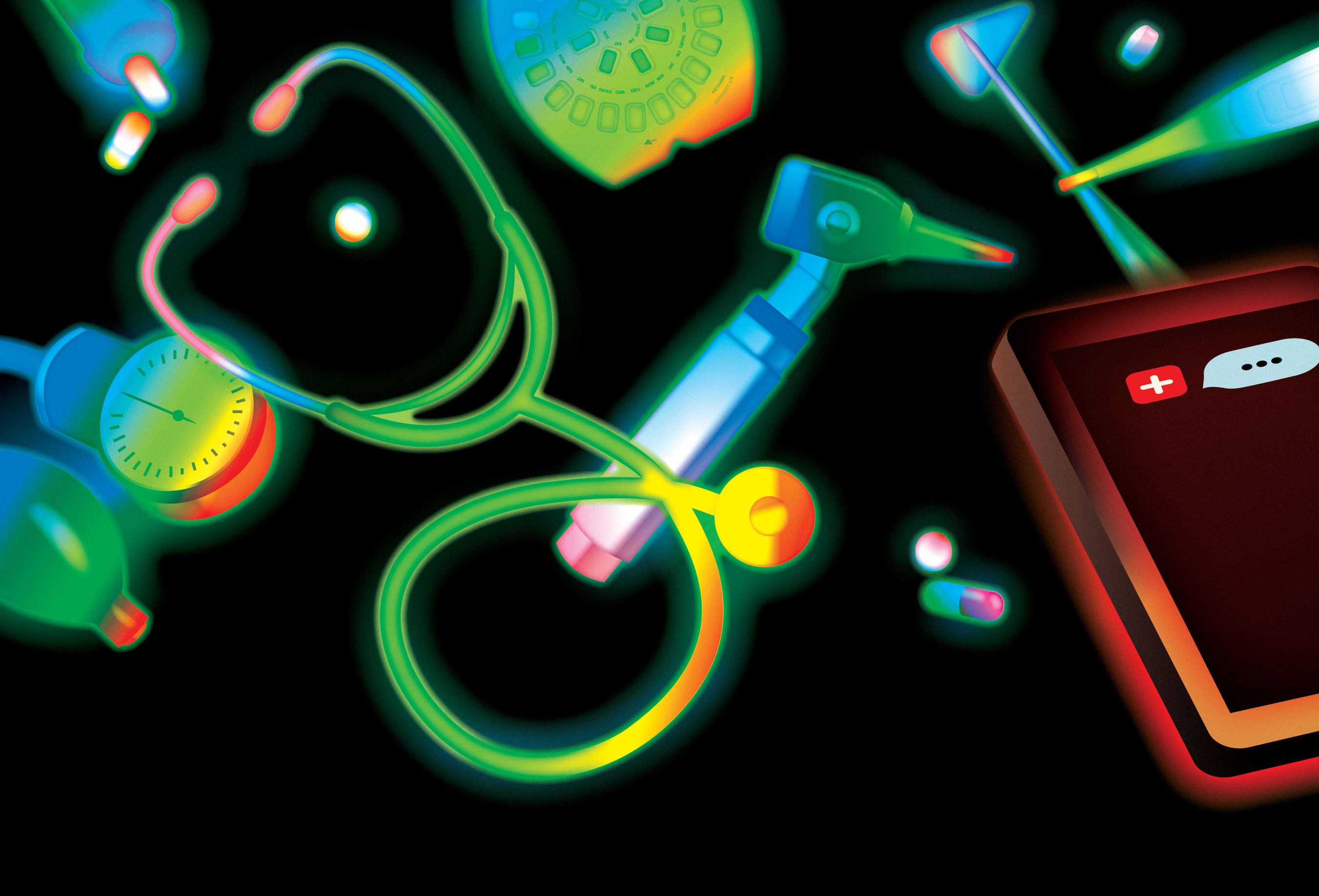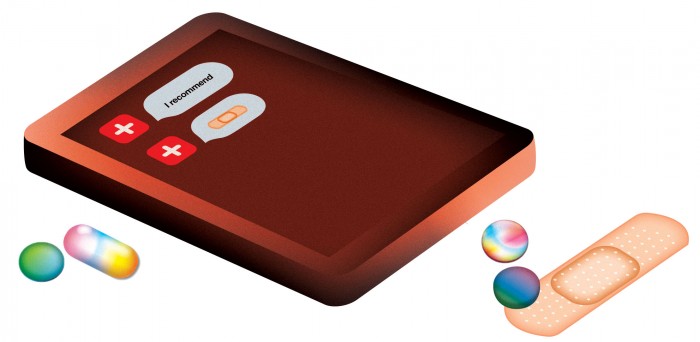Your next doctor’s appointment might be with an AI
A new wave of chatbots are replacing physicians and providing frontline medical advice—but are they as good as the real thing?

“My stomach is killing me!”
“I’m sorry to hear that,” says a female voice. “Are you happy to answer a few questions?”
And so the consultation begins. Where’s the pain? How bad is it? Does it come and go? There’s some deliberation before you get an opinion. “This sounds like dyspepsia to me. Dyspepsia is doctor-speak for indigestion.”
Doctor-speak, maybe, but it’s not a doctor speaking. The female voice belongs to Babylon, part of a wave of new AI apps designed to relieve your doctor of needless paperwork and office visits—and reduce the time you have to wait for medical advice. If you’re feeling unwell, instead of calling a doctor, you use your phone to chat with an AI.
The idea is to make seeking advice about a medical condition as simple as Googling your symptoms, but with many more benefits. Unlike self-diagnosis online, these apps lead you through a clinical-grade triage process—they’ll tell you if your symptoms need urgent attention or if you can treat yourself with bed rest and ibuprofen instead. The tech is built on a grab bag of AI techniques: language processing to allow users to describe their symptoms in a casual way, expert systems to mine huge medical databases, machine learning to string together correlations between symptom and condition.
Babylon Health, a London-based digital-first health-care provider, has a mission statement it likes to share in a big, bold font: to put an accessible and affordable health service in the hands of every person on earth. The best way to do this, says the company’s founder, Ali Parsa, is to stop people from needing to see a doctor.
When in doubt, the apps will always recommend seeking a second, human opinion. But by placing themselves between us and medical professionals, they shift the front line of health care. When the Babylon Health app started giving advice on ways to self-treat, half the company’s patients stopped asking for an appointment, realizing they didn’t need one.
Babylon is not the only app of its kind—others include Ada, Your.MD, and Dr. AI. But Babylon is the front-runner because it’s been integrated with the UK’s National Health Service (NHS), showing how such tech could change the way health services are run and paid for. Last year Babylon started a trial with a hospital trust in London in which calls to the NHS’s non-emergency 111 advice line are handled partly by Babylon’s AI. Callers are asked if they want to wait for a human to pick up or download the Babylon-powered “NHS Online: 111” app instead.
Around 40,000 people have already opted for the app. Between late January and early October 2017, 40% of those who used the app were directed to self-treatment options rather than a doctor—around three times the proportion of people who spoke to a human operator. But both the AI and the humans staffing the phone line told the same proportion of people to seek emergency care (21%).
When the app started giving advice on ways to self-treat, half of patients stopped asking for an appointment, realizing they didn’t need one.
Now Babylon has also co-launched the UK’s first digital doctor’s practice, called GP at Hand. People in London can register with the service as they would with their local doctor. But instead of waiting for an appointment slot and taking time off work to see a physician in person, patients can either chat with the app or talk to a GP at Hand doctor on a video link. And in many cases the call isn’t needed. The human doctor becomes your last resort rather than your first.

GP at Hand has proved popular; some 50,000 people registered in the first few months, among them Matt Hancock, the UK health minister. Babylon now wants to expand across the UK. The service is also available in Rwanda, where 20% of the adult population has already signed up, according to Mobasher Butt, a doctor and a member of Babylon’s founding team. And it’s setting up services in Canada, with plans to do the same in the US, the Middle East, and China.
Your doctor is overloaded
For 70 years, the NHS has provided free medical care to anyone who needs it, paid for by UK taxpayers. But it is showing signs of strain. Two generations ago there were 50 million Britons, and their average life expectancy was not much over 60 years. There are now 66 million, and most can expect to live into their 80s. That stretches the resources of a system that has never been flush with cash.
On average, people in the UK see a doctor six times a year, twice as often as a decade ago. From 2011 to 2015, the average GP clinic’s patient list grew by 10% and its number of contacts with patients (by phone or in person) grew by 15.4%, according to a survey by the King’s Fund. In a survey by the British Medical Association in 2016, 84% of general practitioners said they found their workload either “unmanageable” or “excessive,” with “a direct impact on the quality” of care they gave their patients.
In turn, people often have to wait days to get a non-urgent consultation. Many show up at hospital emergency departments instead, adding even more strain to the system. “We have the perception that it’s older people who turn up [at the emergency room],” says Lee Dentith, CEO and founder of the Now Healthcare Group, a health-tech company based in Manchester, UK. “But it’s not. It’s the 18- to 35-year-olds who are unwilling to wait a week for an appointment.”
Population and life expectancy will continue to grow. By 2040, it is estimated, the UK will have more than 70 million people, one in four of whom will be over 65. Most other rich countries are also getting older.
At the same time, the next few decades will see more people living with long-term illnesses such as diabetes and heart disease. And better treatment for diseases like cancer means millions more people will be living with or recovering from them.
Of course, the UK is not alone. Whether because of prohibitive costs in the US or the lack of medical professionals in Rwanda, “all health systems around the world are stretched,” says Butt. “There’s not enough clinical resources. There’s not enough money.”
Which is where companies like Babylon come in. A chatbot can act as a gatekeeper to overworked doctors. Freeing up even more of the doctor’s time, the AI can also handle paperwork and prescriptions, and even monitor care at home.
A chatbot can also direct people to the right provider. “A GP is not always the best person to see,” says Naureen Bhatti, a general practitioner in East London. “A nurse might be better at dressing a wound, and a pharmacist might be better for advice about a repeat prescription. Anything that helps unload a very overloaded system, allowing doctors to do what they are best at, is always welcome.”
Sometimes AI is just better
Bhatti remembers how upset lots of doctors were when patients first started bringing in printouts from their own web searches. “How dare they try and diagnose themselves! Don’t think you can negate my six years at medical school with your one hour on the internet.” But she likes to see it from the patients’ perspective: “Well, don’t think you can negate my six years of living with this illness with your one-hour lecture at medical school.”
When a patient does meet a doctor face to face, the AI can still help by suggesting diagnoses and possible treatments. This is useful even when a doctor is highly skilled, says Butt, and it’s “really critical” in poorer countries with a shortage of competent doctors.
AI can also help spot serious conditions early. “By the time most diseases are diagnosed, a £10 problem has become a £1,000 one,” says Parsa. “We wait until we break down before going to a doctor.” Catching a disease early slashes the cost of treating it.
These apps first hit the market as private health services. Now they are starting to integrate with national health-care providers and insurers. For example, Ada users can share their chatbot sessions with their NHS doctor, and the company is now working with a handful of GP practices to enable the chatbot to refer them to the doctor. Another app, Now Patient, provides video consultations with your existing doctor, and it also acts as an AI pharmacist. Users can buy their drugs from the Now Healthcare Group’s drug-delivery service. It’s a kind of Amazon for medicines.
“How do we make this a job that people want to do? I don’t think ... consulting from their kitchen is why people get into medicine. They come to meet patients.”
“This is a service that patients really want, that they didn’t previously have, and that is now being provided to them through the NHS 365 days a year, 24 hours a day, for free,” Butt says of Babylon. “And the brilliant thing is it doesn’t cost the NHS a single penny more to deliver that.”
Not only will the AI in these apps get smarter; it will get to know its users better. “We’re building in the ability for patients to manage their health not only when they’re sick, but also when they’re not sick,” says Butt. The apps will become constant companions for millions of us, advising us and coaxing us through everyday health choices.
Death by chatbot?
Not everyone is happy about all this. For a start, there are safety concerns. Parsa compares what Babylon does with your medical data to what Facebook does with your social activities—amassing information, building links, drawing on what it knows about you to prompt some action. Suggesting you make a new friend won’t kill you if it’s a bad recommendation, but the stakes are a lot higher for a medical app.
According to Babylon, its chatbot can identify medical conditions as well as human doctors do, and give treatment advice that’s safer. In a study posted online in June and coauthored with researchers at Imperial College London, Stanford University, and the Northeastern Medical Group, Babylon put its AI through a version of the final exam of the Royal College of General Practitioners (RCGP), which British GPs must pass in order to practice unsupervised. Babylon’s AI scored 81%, 9% higher than the average grade achieved by UK medical students.
The RCGP was quick to distance itself from Babylon’s hype, however. “The potential of technology to support doctors to deliver the best possible patient care is fantastic, but at the end of the day, computers are computers, and GPs are highly trained medical professionals: the two can’t be compared and the former may support but will never replace the latter,” said RCGP vice chair Martin Marshall in a statement. “No app or algorithm will be able to do what a GP does.”

Others level far more serious charges, suggesting that Babylon has focused on making its service accessible and affordable at the expense of patients’ safety. One Twitter user with the handle DrMurphy11 (he’s an NHS consultant who told me he needs to remain anonymous because of the corporate culture there) has coined the hashtag #DeathByChatbot. In videos showing interactions with the app, DrMurphy11 suggests that Babylon’s AI misses obvious diagnoses and fails to ask the right questions. “I have no concerns about health tech or AI in general,” he says. “No doctor wants to make mistakes, and any system that helps minimize the risk of harm from human error will be welcomed.” But he’s worried that companies are misleading doctors and the public with marketing claims that vastly oversell their current tech.
Babylon has also met with criticism in Rwanda, where it runs the Babyl service, for not taking local epidemiology into account. In an interview with the BBC, Rwanda’s minister of health claimed that the Babyl app included no questions about malaria, for example (although Babylon disputes this).
Still, while Babylon may not be as good as a real doctor (and such apps are always careful to recommend you see a real doctor when in doubt), playing it too safe would defeat the purpose. “We wanted to re-create the same pragmatic approach that a clinician takes,” says Butt. “If we just had a group of nonclinical people building the service, they might have gone for something that was 100 percent safe, but that could mean you send everyone to hospital, which is not what a real doctor or nurse would do.”
Another fear is that digital-first services will create a two-tiered health-care system. For example, GP at Hand advises people with serious medical issues to think twice about signing up to a practice that offers mostly remote access to doctors. That might seem prudent, but it has led to accusations that GP at Hand is effectively cherry-picking younger patients with less complex—and less expensive—health-care needs. Since British GP practices get per-patient funding from the NHS, cherry-picking would mean the rest of the health-care system is left to do more with less.
For some GPs, this isn’t acceptable. “We take everybody,” says Bhatti. But Oliver Michelson, a spokesperson for the NHS, accepts that GP at Hand has to issue some form of caveat—it can’t realistically welcome everyone. “They are not denying people access but saying that if you’re going to need to come into your GP regularly, a digital-first service may not be the best place to be,” he says.
And Butt insists that they exclude nobody. “The service is available to everyone,” he says; it just may not suit some people, such as those with severe learning difficulties or visual impairments, who would struggle with the app.
People still come in handy
For Bhatti, having a local doctor who knows you is a crucial part of the health system. “Knowing your doctor saves lives,” she says. “Doctors will pick up things because there’s continuity.” She thinks this is just as much an issue for doctors as for patients. “How do we make this a job people want to do?” she says. “I don’t think people working flexibly, consulting from their kitchen, is why people come to medicine. They come to meet patients.”
Not even Butt envisions chatbots replacing human doctors entirely. “Care is not just about diagnosing or prescribing medicine,” he says. “It’s about knowing your patient is going to be able to cope with the chemotherapy you’re proposing for them, knowing that their family will be able to offer them the support that they’re going to need for the next few months. Currently there is no software that’s going to be able to replace that.”
Keep Reading
Most Popular
Large language models can do jaw-dropping things. But nobody knows exactly why.
And that's a problem. Figuring it out is one of the biggest scientific puzzles of our time and a crucial step towards controlling more powerful future models.
How scientists traced a mysterious covid case back to six toilets
When wastewater surveillance turns into a hunt for a single infected individual, the ethics get tricky.
The problem with plug-in hybrids? Their drivers.
Plug-in hybrids are often sold as a transition to EVs, but new data from Europe shows we’re still underestimating the emissions they produce.
Google DeepMind’s new generative model makes Super Mario–like games from scratch
Genie learns how to control games by watching hours and hours of video. It could help train next-gen robots too.
Stay connected
Get the latest updates from
MIT Technology Review
Discover special offers, top stories, upcoming events, and more.